Imagine a world without the gentle buzz of bees flitting from flower to flower on a warm, sunny day. It might seem quieter, more serene, perhaps, but this silence signifies a dire threat to the very fabric of our ecosystems. Bees, these tiny, industrious insects, are the unsung heroes of our environment, playing a pivotal role in sustaining the life cycle of many plants and, by extension, the survival of countless species, including humans.
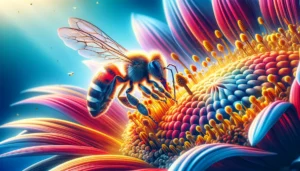 Often, we take for granted the bounty of fruits, vegetables, and nuts that grace our tables, rarely pausing to consider the complex process from flower to feast. This journey, more often than not, begins with a bee, a master pollinator, whose daily toil underpins the vast diversity of life that forms the tapestry of our natural world. In this blog, we will delve into the fascinating world of bees, uncovering the vital role they play in pollination and why their well-being is crucial for maintaining the balance of our ecosystems. Join us as we explore the elaborate dance between bees and blossoms, a symbiotic relationship that fuels the engine of biodiversity and sustains our very existence.
Often, we take for granted the bounty of fruits, vegetables, and nuts that grace our tables, rarely pausing to consider the complex process from flower to feast. This journey, more often than not, begins with a bee, a master pollinator, whose daily toil underpins the vast diversity of life that forms the tapestry of our natural world. In this blog, we will delve into the fascinating world of bees, uncovering the vital role they play in pollination and why their well-being is crucial for maintaining the balance of our ecosystems. Join us as we explore the elaborate dance between bees and blossoms, a symbiotic relationship that fuels the engine of biodiversity and sustains our very existence.
Understanding Pollination
- The Heartbeat of the Plant World
Pollination is the heartbeat of the plant world, a fundamental process that enables plants to reproduce and thrive. At its core, pollination involves the transfer of pollen from the male part of a flower (the stamen) to the female part (the pistil). This seemingly simple act sets the stage for fertilization, seed production, and the birth of new plants, ensuring the continuity of plant species and the vast diversity of our planet’s flora.
- Bees: Nature’s Master Pollinators
Enter the bee, nature’s master pollinator. Bees are uniquely designed for this task, with bodies that easily pick up pollen and carry it from flower to flower. As they move in their quest for nectar, they inadvertently brush against pollen, collecting and depositing it on subsequent flowers they visit. This process is not just a happy accident; it’s a critical ecological service that bees provide, enabling the cross-pollination necessary for many plants to produce fruit and seeds.
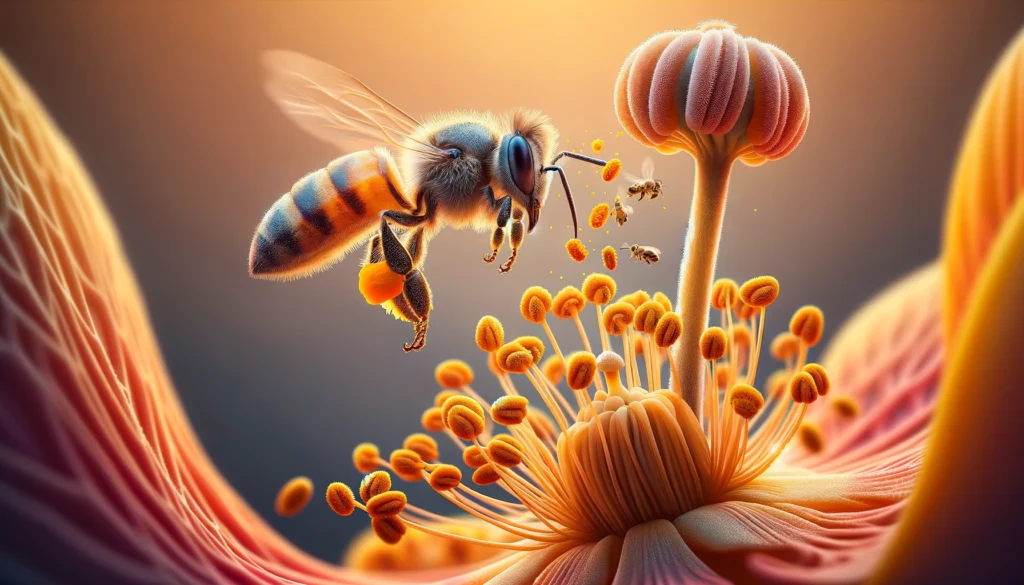
- Why Bees Excel at Pollination
But why are bees so effective at pollination? Unlike other insects, bees are fuzzy, with numerous hairs on their bodies that trap pollen grains with ease. Furthermore, their behavior and body structure are perfectly suited to the task. They have a strong work ethic, are excellent navigators, and possess a methodical approach to foraging that ensures thorough pollination of the plants they visit.
This diligent work of bees doesn’t just benefit the flowers; it’s a cornerstone of our food system. About one-third of the food we consume each day relies on pollination, primarily by bees. This includes many of the fruits, vegetables, and nuts that are staples of our diet, not to mention the many plants used to feed the animals we rely on for milk and meat.
The Life of Bees
- The Busy Bee’s Lifestyle
The life of a bee is a testament to nature’s intricacy and efficiency. Within the bee colony, every bee has a role that supports the community and its survival. Worker bees, the most commonly seen bees buzzing around flowers, are tireless pollinators. They spend their days collecting nectar and pollen to feed the colony and, in the process, facilitate the pollination of countless plants.
- Types of Bees and Their Roles
Not all bees are the same, and their diversity is fascinating. From the well-known honeybees and bumblebees to solitary bees like mason bees and leafcutter bees, each species plays a part in the ecosystem’s pollination network. Honeybees, for instance, are social insects forming large colonies, while solitary bees work alone but are still effective pollinators, often specializing in pollinating specific types of plants.
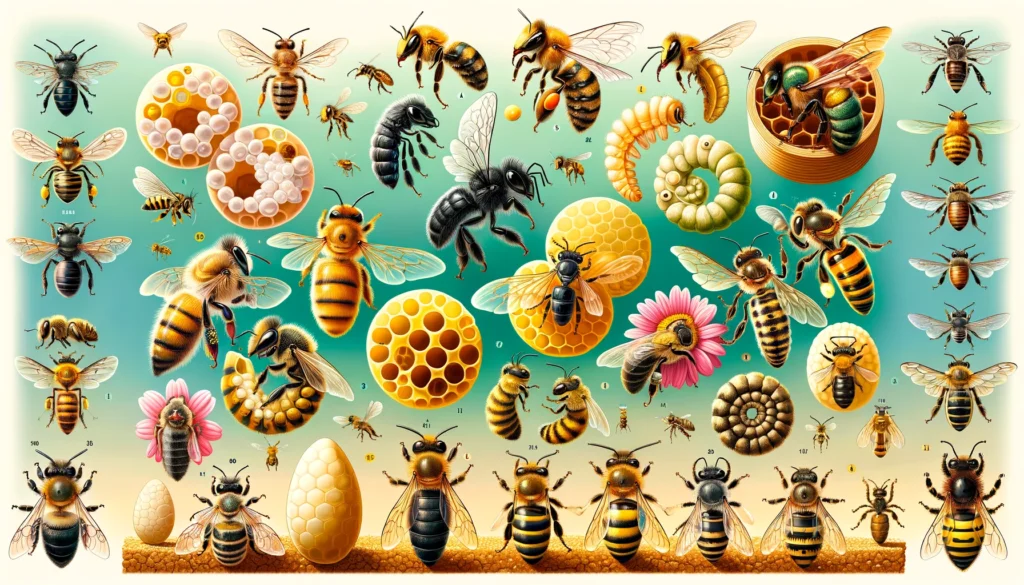
- Bee Behavior and Pollination
Bees are not just random visitors to flowers; they engage in a complex relationship with plants. Their foraging behavior, guided by the search for nectar and pollen, leads them to visit numerous flowers of the same species during a single trip, enhancing the chances of successful cross-pollination. This behavior, known as flower constancy, is crucial for effective plant reproduction and is a trait that makes bees exceptionally good pollinators.
Bees’ interaction with flowers is a delicate dance of mutual benefit. The flowers provide bees with the food resources they need, while bees ensure the flowers’ reproductive success through pollination. This interdependence has evolved over millions of years and is a key driver of the biodiversity we see in natural ecosystems today.
Bees and Biodiversity
- Pollinators Powering Biodiversity
Bees are more than just pollinators; they are catalysts for biodiversity. Their pollination efforts are essential for the reproductive success of a wide range of plants, which in turn form the basis of food chains and ecosystems. The diversity of plant life sustained by bee pollination contributes to a rich and varied ecosystem, supporting a multitude of organisms from insects to large mammals.
- A Ripple Effect in the Ecosystem
The impact of bees extends far beyond the plants they pollinate. By ensuring plant diversity, bees support the survival of various animal species that rely on different plants for food and habitat. This creates a cascading effect throughout the ecosystem, where the presence and health of one species influence the well-being of others. The decline of bee populations, therefore, has far-reaching consequences, threatening the stability and functionality of ecosystems worldwide.

- Bees as Indicators of Environmental Health
The health of bee populations can also serve as an indicator of the overall health of an ecosystem. Healthy, thriving bee communities suggest a well-functioning ecosystem with a good balance of plant and animal species. Conversely, declining bee numbers can signal environmental problems that may not be immediately obvious, such as habitat loss, pollution, or climate change impacts.
By maintaining the health and diversity of bee populations, we support the broader health of our ecosystems. The intricate connections between bees, plants, and other wildlife underscore the importance of conserving these vital insects, not just for their sake but for the overall health of our planet.
Threats to Bee Populations
- The Plight of the Pollinators
Bees are facing an array of threats that jeopardize their survival and, consequently, the health of ecosystems worldwide. Habitat loss due to urbanization, agriculture, and deforestation is one of the most significant challenges. As natural landscapes are converted into cities or farmland, bees lose the diverse habitats they require for nesting and foraging.
- Pesticides and Pollution
The widespread use of pesticides and chemicals in agriculture and gardening is another major threat to bees. These substances can be toxic to bees, impairing their ability to navigate, forage, and reproduce. Pollution, too, affects bees by contaminating the air and plants they depend on, further stressing their populations.
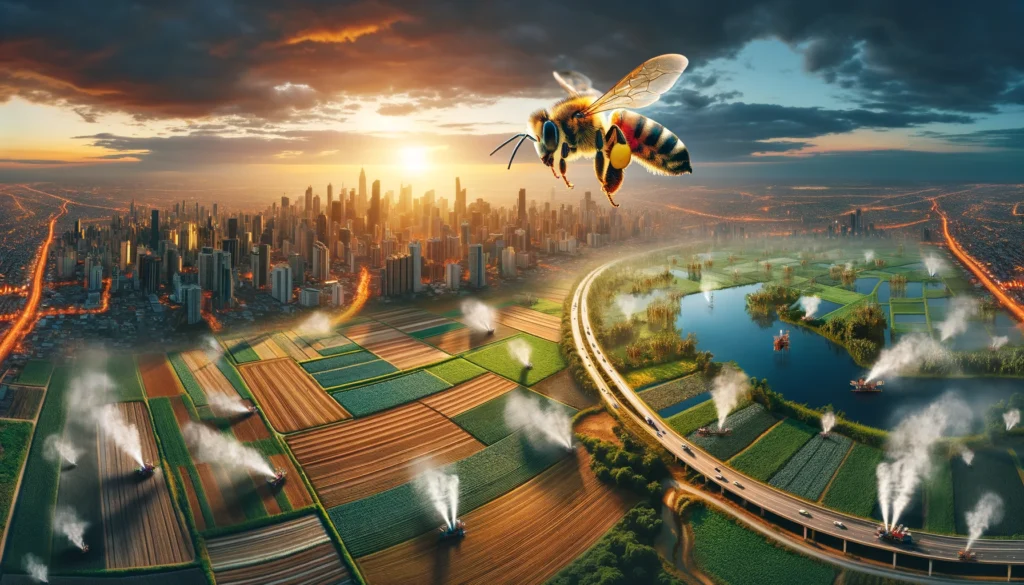
- Climate Change and Its Impact
Climate change is also having a profound effect on bees, altering the timing of flower blooming and thus disrupting the synchrony between bees and the plants they pollinate. Extreme weather conditions, such as heatwaves, droughts, and heavy rains, can destroy habitats, reduce food availability, and directly harm bee health.
- Consequences of Declining Bee Populations
The decline in bee populations carries serious implications for global food security and ecosystems. As bees diminish, the pollination process is hampered, leading to reduced crop yields, loss of plant diversity, and the subsequent impact on animals that depend on those plants for food and shelter. This decline threatens the very foundations of biodiversity, upon which human life also depends.
How We Can Help Bees
- Creating Bee-Friendly Environments
One of the most effective ways to support bees is by creating environments that cater to their needs. Planting a variety of flowering plants that bloom at different times of the year can provide bees with a consistent source of nectar and pollen. Avoiding the use of pesticides and chemicals in gardening and opting for organic or bee-friendly alternatives can also make a significant difference in preserving bee health.
- Supporting Sustainable Agriculture
Choosing to buy products from farms that practice sustainable agriculture can help protect bees. These farms often use bee-friendly practices, such as crop rotation, organic pest control, and the maintenance of natural habitats, which support diverse bee populations.
- Community and Legislative Actions
On a larger scale, advocating for and supporting legislation that protects natural habitats, regulates pesticide use, and addresses climate change can have a profound impact on bee survival. Community initiatives, like establishing bee sanctuaries, urban beekeeping, and educational programs, can also play a vital role in raising awareness and fostering environments where bees can thrive.
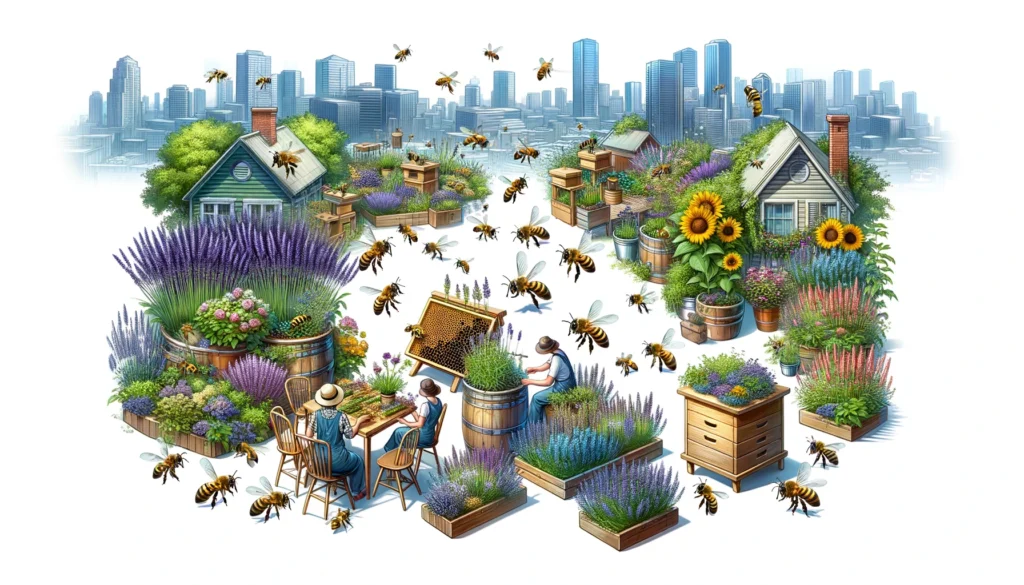
- The Power of Individual Actions
Individual actions, no matter how small, contribute to a larger collective effort to save bees. Whether it’s planting bee-friendly flowers, supporting local beekeepers, or spreading awareness about the importance of bees, every action counts. By taking these steps, we not only aid in bee conservation but also ensure the preservation of our broader ecosystems.
Conclusion
Bees are more than just insects buzzing around our gardens; they are fundamental to the survival of our ecosystems and the prosperity of human life. As master pollinators, bees play a critical role in the reproduction of plants, supporting the complex web of life that includes everything from the smallest insects to the largest mammals, including ourselves. The decline of bee populations due to habitat loss, pesticide use, pollution, and climate change poses a significant threat to biodiversity and global food security.
Understanding the pivotal role bees play in pollination and ecosystem health allows us to appreciate the urgency of conserving their populations. It’s not just about saving bees; it’s about maintaining the balance of nature and ensuring our survival. By creating bee-friendly environments, supporting sustainable practices, and advocating for policies that protect the natural world, we can make a difference.
Let’s not take bees for granted. It’s time to acknowledge their crucial role in our lives and take action to ensure their survival and the health of our planet. Each of us has a part to play in this mission. By educating ourselves and others, making bee-friendly choices in our gardens and communities, and supporting policies that protect bees, we can contribute to a world where these essential pollinators thrive, securing the future of our ecosystems for generations to come.
Author’s Note
Writing this blog has been a journey of discovery and reaffirmation of the crucial role bees play in our ecosystems. Their tireless work not only sustains the natural world but also supports our agricultural systems, underpinning much of the food we consume. I hope this piece not only enlightens but also inspires action. Protecting bees is not just an act of environmental stewardship; it’s a necessary commitment to our future. Let’s all do our part in ensuring that bees continue to buzz in our gardens and fields, pollinating the planet and enriching our world.
G.C., Ecosociosphere contributor.
References and Further Reading
To deepen your understanding of the topics discussed in this blog, consider exploring the following books:
- “The Beekeeper’s Lament” by Hannah Nordhaus
This book provides an insightful look into the world of beekeeping and the challenges bees and beekeepers face in the modern world. - “Bees in Your Backyard: A Guide to North America’s Bees” by Joseph S. Wilson and Olivia J. Messinger Carril
A comprehensive guide to the diverse species of bees in North America, this book offers a detailed look at their habits, habitats, and how to support them. - “Buzz: The Nature and Necessity of Bees” by Thor Hanson
Hanson’s book delves into the fascinating world of bees, exploring their role in ecosystems and the importance of conserving their populations for the health of our planet.
These books offer a blend of scientific insight, practical guidance, and personal narratives that will enhance your understanding of bees and their essential role in our ecosystems.


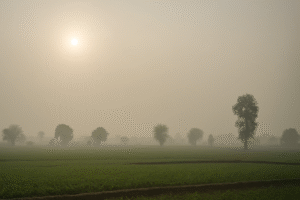

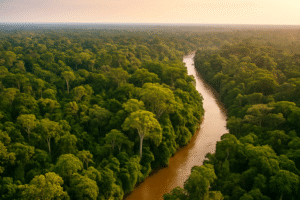
Comments
Can you be more specific about the content of your article? After reading it, I still have some doubts. Hope you can help me.
Thank you for your sharing. I am worried that I lack creative ideas. It is your article that makes me full of hope. Thank you. But, I have a question, can you help me?